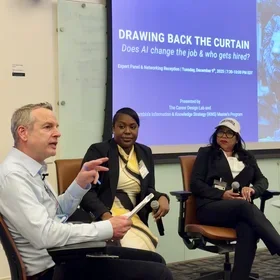Having spent nearly 15 years in the field of artificial intelligence, machine learning, and data analysis, Dr. Jinjun Xiong knows how anxious people can get about the ever-increasing presence of algorithms in their lives. He particularly understands the unease that professionals feel as AI transforms nearly everything around them—after all, many of them are students in Columbia’s M.S. in Applied Analytics program, where he is a part-time lecturer.
So, when students enroll in his course on Machine Learning: Concepts and Applications, Dr. Xiong reassures them of one thing right away: They don’t have to be mathematical geniuses.
“AI and advanced analytics can transform almost any industry, but you need to get the buy-in from people in those different industries,” he said. “If we tell finance people or risk management professionals they need to take all of this advanced math, we’ll probably scare them away!”
For Dr. Xiong, the machine learning course is an opportunity to engage students who don’t share his professional background and help them to grasp the big-picture possibilities that AI offers.
Since earning his Ph.D. in Electrical Engineering from UCLA, in 2006, Dr. Xiong has spent his entire career at IBM Research, where he initially focused on statistical analysis and testing of high-performance microprocessors and ASIC chips for improved yield and optimization. He later transitioned to Smarter Energy research, working with global electric utility companies to build advanced data-driven analytic solutions to improve their operational efficiency and planning optimization. He is now Program Director for Cognitive Computing Systems Research at the IBM Thomas J. Watson Research Center.
“Each of those roles was about how to use advanced analytics to solve real industry problems,” he said. “That’s kind of the theme of my career.”
With increased availability of data, advanced algorithms, improvements in computational power, and the connection to the cloud, any business process can be transformed.
Dr. Jinjun Xiong, Lecturer, M.S. in Applied Analytics
Noting that the public perception of AI has tended to fluctuate between periods of hopeful “hype” and gloomy “winter,” Dr. Xiong acknowledges the perennial concern that machines are out to replace people. (Indeed, the term “cognitive computing,” he said, was conceived in part as a softer alternative to “artificial intelligence.”) But he passionately believes that AI and advanced analytics are meant to augment human intelligence and gives us the capacity to effect profound change.
“You can pretty much pick any industry and consider how—with increased availability of data, advanced algorithms, improvements in computational power, and also the connection to the cloud—any business process can be transformed,” he said.
In 2017, when Columbia launched the Applied Analytics program, a friend of Dr. Xiong suggested he teach the introductory machine learning course. Given the diverse backgrounds of the students in the program, he designed the course around three main principles:
-
Everyone should understand the fundamental concepts of machine learning.
-
Everyone should understand the intuition behind an algorithm, including why it was designed in such a way.
-
Everyone should be able to understand these concepts and intuitions with basic mathematics.
“Most of my students will be going back to the roles they had before taking the course—like being a project manager who oversees the people developing the applications,” he said. “They don’t necessarily need to know how an algorithm gets implemented in terms of computer science. But they need to know how to communicate effectively with their teams or explain to their leadership why machine learning will be valuable for certain projects.”
Given how rapidly AI and advanced analytics are changing things, Dr. Xiong believes the most important thing for his students is to have an open mind.
“People from any industry need to have an open mind for what’s possible and to learn from other industries as well,” he said. “You don’t have to be an expert in every single industry or subject. But having an open mind, knowing what’s going on, and being willing to try, willing to learn, and learning to communicate about it in a meaningful way—that’s the mindset I’m trying to teach.”
Learn more about the M.S. in Applied Analytics


